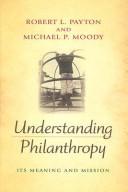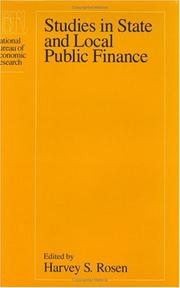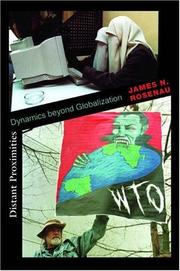| Listing 1 - 7 of 7 |
Sort by
|
Book
Year: 1656 Publisher: [London : s.n.,
Abstract | Keywords | Export | Availability | Bookmark
 Loading...
Loading...Choose an application
- Reference Manager
- EndNote
- RefWorks (Direct export to RefWorks)
eebo-0018

ISBN: 1281726451 9786611726454 0253000130 9780253000132 0253350492 9780253350497 Year: 2008 Publisher: Bloomington Indiana University Press
Abstract | Keywords | Export | Availability | Bookmark
 Loading...
Loading...Choose an application
- Reference Manager
- EndNote
- RefWorks (Direct export to RefWorks)
Philanthropy has existed in various forms in all cultures and civilizations throughout history, yet most people know little about it and its distinctive place in our lives. Why does philanthropy exist? Why do people so often turn to philanthropy when we want to make the world a better place? In essence, what is philanthropy? These fundamental questions are tackled in this engaging and original book. Written by one of the founding figures in the field of philanthropic studies, Robert L. Payton, and his former student sociologist Michael P. Moody, Understanding Philanthropy presents a new way
Humanitarianism. --- Charities. --- Charity. --- Human welfare --- Philanthropy --- Social welfare --- Charities --- Ethics --- Alms and almsgiving --- Benevolent institutions --- Charitable institutions --- Endowed charities --- Institutions, Charitable and philanthropic --- Poor relief --- Private nonprofit social work --- Relief (Aid) --- Associations, institutions, etc. --- Poor --- Social service --- Endowments --- Conduct of life --- Societies, etc. --- Services for --- Charitable giving.

ISBN: 0226726215 9786611223960 1281223964 0226726258 9780226726250 9780226726212 Year: 1986 Publisher: Chicago : University of Chicago Press,
Abstract | Keywords | Export | Availability | Bookmark
 Loading...
Loading...Choose an application
- Reference Manager
- EndNote
- RefWorks (Direct export to RefWorks)
In fiscal year 1981-82, state and local government spending actually exceeded federal nondefense spending. However, past research in public finance has focused on federal spending and policies and paid little attention to the economic problems of state and local governments. Studies in State and Local Public Finance goes far in correcting this omission. Developed from a National Bureau of Economic Research conference on state and local financing, the volume includes papers summarizing and extending recent research as well as commentaries. Covering a wide range of topics, the papers share an empirical orientation and a concern with policy issues. The first two papers look at the role of tax-exempt bonds in local public finance. Their findings suggest that tax policies significantly affect municipal borrowing practices and that financial advantage can be achieved under certain of these practices. Other papers address specific issues related to state and local tax policy: the impact of local taxes on location decisions; efficient road-use charges for trucks; and the relation of income and general sales tax systems over time. Examining issues related to United States federalism, the last paper focuses on the impact of federal grant aid to states. The research and findings these papers report make an important contribution to the study of local public finance and should be of particular interest to policymakers and those involved in private and public financing at the local, state, or federal level.
Public finance --- United States --- Finance, Public --- Local finance --- Finances publiques --- Finances locales --- States --- States. --- finances publiques --- finances publiques villes et communes --- openbare financien --- openbare financien steden en gemeenten --- E-books --- Specie payments --- Finance, Public - United States - States. --- Local finance - United States. --- financial, wealth, income, regional, economics, economy, academic, scholarly, research, federal, government, 1980s, history, historical, 20th century, defense, nondefense, spending, policies, political, national, bureau, financing, policy, tax, local, grant, aid, nonprofit, volunteer, charitable, giving, behavior, analysis, textbook. --- United States of America
Book
ISBN: 9781479860807 Year: 2020 Publisher: New York New York University Press
Abstract | Keywords | Export | Availability | Bookmark
 Loading...
Loading...Choose an application
- Reference Manager
- EndNote
- RefWorks (Direct export to RefWorks)
nonreligious identity --- atheism --- irreligion --- personal identity --- self --- personality --- ego --- individuality --- Non-belief --- unbelief --- philosophy --- religion --- agnosticism --- Free thought --- secularism --- Theism --- Canada --- United States (US) --- religious right --- abortion --- apostasy --- atheists --- believing without belonging --- charitable giving --- deep equality --- defining religion --- demographics --- disaffiliation --- discrimination --- diversity --- environment --- evangelicals --- exclusive religions --- fertility rates --- governmental aid --- growth rates --- immigration --- inactive believers --- inactive non-believers --- inclusive religions --- irreligious socialization --- same-sex marriage --- secularization --- pluralism --- polarization --- sociology --- spirituality --- child socialization --- children --- enculturation --- education

ISBN: 0691095248 069109523X 9780691095240 0691231117 Year: 2003 Publisher: Princeton, N.J. : Princeton University,
Abstract | Keywords | Export | Availability | Bookmark
 Loading...
Loading...Choose an application
- Reference Manager
- EndNote
- RefWorks (Direct export to RefWorks)
Has globalization the phenomenon outgrown "globalization" the concept? In Distant Proximities, one of America's senior scholars presents a work of sweeping vision that addresses the dizzying anxieties of the post-Cold War, post-September 11 world. Culminating the influential reassessment of international relations he began in 1990 with Turbulence in World Politics, James Rosenau here undertakes the first systematic analysis of just how complex these profound global changes have become. Among his many conceptual innovations, he treats people-in-the-street as well as activists and elites as central players in what we call "globalization." Deftly weaving striking insights into arresting prose, Rosenau traces the links and interactions between people at the individual level and institutions such as states, nongovernmental organizations, and transnational corporations at the collective level. In doing so he masterfully conveys how the emerging new reality has unfolded as events abroad increasingly pervade the routines of life at home and become, in effect, distant proximities. Rosenau begins by distinguishing among various local, global, and private "worlds" in terms of their inhabitants' orientations toward developments elsewhere. He then proceeds to cogently analyze how the residents of these worlds shape and are shaped by the diverse collectivities that crowd the global stage and that sustain such issues as human rights, corruption, the global economy, and global governance. Throughout this richly imaginative, fluidly written book, Rosenau examines how anti-globalization protests and the terrorist attacks on America amount to quintessential distant proximities. His book is thus a pathbreaking inquiry into the dynamics that lie beyond globalization, one that all thoughtful observers of the world scene will find penetrating and provocative.
International relations. --- Geografie --- Sociale geografie --- Maatschappij. --- POLITICAL SCIENCE / International Relations / General. --- Affirmative Locals. --- Buchanan, Patrick. --- Camdessus, Michel. --- Cuban exiles. --- Exclusionary Locals. --- Fidelity Investments. --- James, William. --- Mandela, Nelson. --- Microcredit Summit Campaign. --- National Basketball Association. --- Netanyahu, Benjamin. --- Nike corporation. --- acculturation. --- activists. --- adaptation. --- bargaining. --- behavioralism. --- birth control education. --- capital accumulation. --- centralization. --- charitable giving. --- churches. --- civic cultures. --- communications revolution. --- communitarian philosophy. --- currency transactions. --- cyclical processes. --- decentralization. --- distant proximities. --- drugs. --- economic globalization. --- education. --- epistemic communities. --- feedback loops. --- fragmegration. --- global structures. --- governance: and authority. --- habits. --- hackers. --- homogenization. --- human systems. --- identiscapes. --- imagined communities. --- indigenous peoples. --- knowledge workers. --- ladder of abstraction. --- legitimacy. --- militia groups. --- modernization. --- nationwide consensuses. --- nonlinear dynamics. --- Coexistence --- Foreign affairs --- Foreign policy --- Foreign relations --- Global governance --- Interdependence of nations --- International affairs --- Peaceful coexistence --- World order --- National security --- Sovereignty --- World politics --- Relacions internacionals.
Book
ISBN: 9811071195 9811071187 Year: 2018 Publisher: Basingstoke Springer Nature
Abstract | Keywords | Export | Availability | Bookmark
 Loading...
Loading...Choose an application
- Reference Manager
- EndNote
- RefWorks (Direct export to RefWorks)
This book is open access under a CC BY 4.0 license. This cutting edge text considers how Asian philanthropists and charitable organizations break with Western philanthropic traditions and examines the key traits and trends that make social investment in Asia unique. Based on 30 case studies of excellent social delivery organizations (SDOs) and social enterprises as well as interviews with ultra-high net-worth individuals throughout Asia, this book examines which characteristics and strategies lead to successful philanthropy and social delivery organizations. Providing evidence based findings on philanthropy, social investment and social delivery organizations in Asia, this book provides invaluable resources for those wishing to deepen their understanding of the sector and what this means for political and economic development in the region.
Social sciences. --- Ethnology --- Business ethics. --- Social structure. --- Social inequality. --- Social sciences --- Social service. --- Social Sciences. --- Social Work and Community Development. --- Asian Culture. --- Business Ethics. --- Social Theory. --- Social Structure, Social Inequality. --- Asia. --- Philosophy. --- Benevolent institutions --- Philanthropy --- Relief stations (for the poor) --- Social service agencies --- Social welfare --- Social work --- Social philosophy --- Social theory --- Egalitarianism --- Inequality --- Social equality --- Social inequality --- Organization, Social --- Social organization --- Business --- Businesspeople --- Commercial ethics --- Corporate ethics --- Corporation ethics --- Behavioral sciences --- Human sciences --- Sciences, Social --- Social science --- Social studies --- Moral and ethical aspects --- Professional ethics --- Human services --- Political science --- Sociology --- Democracy --- Liberty --- Anthropology --- Social institutions --- Wealth --- Civilization --- Ethnology-Asia. --- Social sciences-Philosophy. --- Ethnology—Asia. --- Social sciences—Philosophy. --- Asian Philanthropy and Charitable Organizations --- Social Investment in Asia --- Social Delivery Organizations --- Relationships and Philanthropy in Asia --- Ultra-high Net-worth Individuals in Asia --- How Social Investment Works in Asia --- Impact of Charitable Giving in Asia --- Relationship with Elites and Social Investment in Asia --- Equality.
Book

ISBN: 1400885264 9781400885268 9780691168685 0691168687 Year: 2017 Publisher: Princeton, NJ
Abstract | Keywords | Export | Availability | Bookmark
 Loading...
Loading...Choose an application
- Reference Manager
- EndNote
- RefWorks (Direct export to RefWorks)
The world of money is being transformed as households and organizations face changing economies, and new currencies and payment systems like Bitcoin and Apple Pay gain ground. What is money, and how do we make sense of it? Money Talks is the first book to offer a wide range of alternative and unexpected explanations of how social relations, emotions, moral concerns, and institutions shape how we create, mark, and use money. This collection brings together a stellar group of international experts from multiple disciplines-sociology, economics, history, law, anthropology, political science, and philosophy-to propose fresh explanations for money's origins, uses, effects, and future.Money Talks explores five key questions: How do social relationships, emotions, and morals shape how people account for and use their money? How do corporations infuse social meaning into their financing and investment practices? What are the historical, political, and social foundations of currencies? When does money become contested, and are there things money shouldn't buy? What is the impact of the new twenty-first-century currencies on our social relations?At a time of growing concern over financial inequality, Money Talks overturns conventional views about money by revealing its profound social potential.
Money --- Currency --- Monetary question --- Money, Primitive --- Specie --- Standard of value --- Social aspects. --- Political aspects. --- Exchange --- Finance --- Value --- Banks and banking --- Coinage --- Currency question --- Gold --- Silver --- Silver question --- Wealth --- Economics --- Social aspects --- Political aspects --- Sociological aspects --- E-books --- Economic sociology --- Socio-economics --- Socioeconomics --- Sociology of economics --- Sociology --- Money. --- SOCIAL SCIENCE / Sociology / General. --- Sociological aspects. --- Australia. --- Bitcoin. --- Bretton Woods. --- China. --- Geoffrey Ingham. --- Indian migrants. --- Russia. --- US Financial Diaries. --- Viviana Zelizer. --- alternative currency. --- asset valuation. --- business money. --- capitalism. --- capitalization. --- charitable giving. --- charity contributions. --- commercial exchanges. --- commercial surrogates. --- complementary currency. --- constitutional approach. --- corporations. --- credit cards. --- credit. --- currency. --- domestic economy. --- donations. --- double-entry bookkeeping. --- earmarking income. --- earmarks. --- economic sociology. --- economic theory. --- egg donor. --- emotion. --- emotional labor. --- emotions. --- finance. --- financial inequality. --- fungibility. --- fungible money. --- gender difference. --- generalized capitalization. --- immateriality. --- industrial money. --- internal design. --- international gold standard. --- international monetary system. --- investment. --- mental accounting. --- migrant remittances. --- mirage. --- modern currency. --- monetary analysis. --- monetary differentiation. --- monetary forms. --- monetary practices. --- monetary valuation. --- money flow. --- money. --- moral judgments. --- morals. --- nationalism. --- nonfungibility. --- organizational budgeting. --- paid donations. --- plastic money. --- public authority. --- purchasing power. --- relational accounting systems. --- sociability. --- social impact. --- social life. --- social meaning. --- social relationships. --- sperm donor. --- transnational money. --- win-lose exchanges. --- world monetary union.
| Listing 1 - 7 of 7 |
Sort by
|

 Search
Search Feedback
Feedback About UniCat
About UniCat  Help
Help News
News